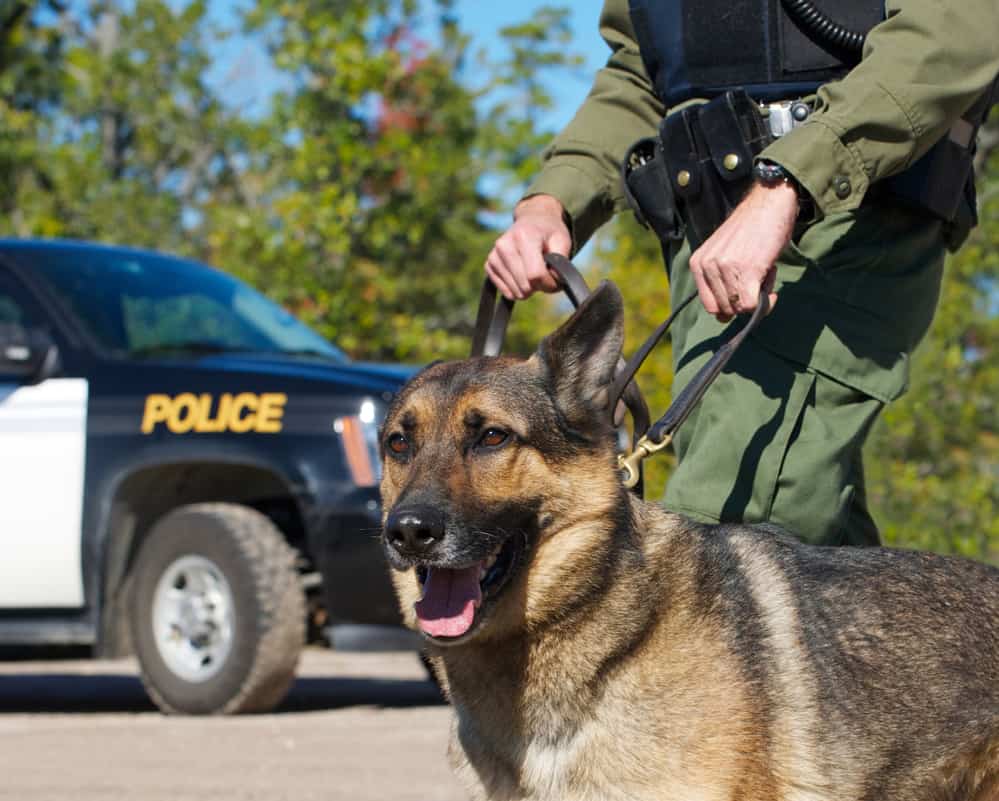The Fourth Amendment to the U.S. Constitution protects an individual from unreasonable search and seizure. The U.S. Supreme Court previously held that if a lawful traffic stop is conducted, the officer may initiate a drug dog sniff. If the two events occur at the same time, the lawful traffic stop doesn’t constitute a search because the individual doesn’t have a reasonable expectation of privacy concerning illegal substances in his or her vehicle.
That said, police officers must follow specific rules when initiating a drug sniff dog on the scene of a lawful traffic stop.
Drug Dog Sniffs in Texas
Law enforcement professionals sometimes use specially-trained canines to identify illegal narcotics. Some drug dogs are trained in a singular illegal substance but others have been trained on an array of drug products.
A police officer may utilize a drug dog to assist in the location of illegal substances when they’d otherwise be prohibited from seizing evidence because of Fourth Amendment privacy concerns:
- Police officers may need to obtain a warrant to search the vehicle in some circumstances.
- A drug dog sniff may assist the officer in locating evidence without implicating the driver’s Fourth Amendment right to privacy.
Drug Dog General Rule
The Supreme Court case, Illinois v. Caballes, lays out the general rule relating to drug dog sniffs. A law enforcement officer stopped a defendant on the road for speeding. After the police brought a drug dog to the traffic stop, the driver was charged with marijuana trafficking:
- The Illinois Supreme Court found that the drug dog sniff was unreasonable. It reversed the conviction when the police offered no additional evidence that the defendant committed any other crime besides speeding.
- However, the U.S. Supreme Court overruled the state supreme court’s decision. It found that the police didn’t require a “reasonable suspicion” to bring a drug dog to sniff the vehicle as long as a legitimate traffic stop occurred and was underway.
- The U.S. Supreme Court ruling allowed the law enforcement officers to walk a trained drug dog around the driver’s vehicle stopped at a legitimate traffic stop.
- When the drug dog alerted the officers to the presence of illegal substances, the police could search the vehicle because they had probable cause.
Specific drug dog rules
Officers don’t have free reign. Although a police officer can initiate a drug dog sniff at a valid traffic stop, he or she must obey specific rules:
- The officer’s reasons to stop the driver must remain based on his or her “reasonable suspicion” that the driver is committing a crime.
- The stop’s legitimacy is measured by its duration. The officer must consider the amount of time to devote to the stop: he or she can’t call to ask for a canine unit. The driver can’t be made to wait for the canine unit to arrive at the traffic stop after the time needed to complete it has elapsed.
- If the police officer can run the driver’s plate, check his or her driver’s license, and write a speeding ticket before the canine unit can arrive to initiate the drug dog sniff, the driver can’t be detained. In most cases, if the driver is pulled over for a traffic stop and the officer threatens to call in the dogs, the driver isn’t required to wait for them to arrive.
- He or she could ask, “Officer, may I go now?” If the officer doesn’t allow the driver to go, he or she should remain silent and refuse any drug dog sniff searches. The driver has the right to refuse a drug dog search even when the officer claims he or she must submit. He or she could alert the officer by saying, “Officer, I dispute any searches” one or several times.
- In some cases, the driver may be detained “for a reasonable period” under Texas law. If the officer has a “reasonable suspicion” of a crime while he or she conducts the traffic stop aspects, the driver must wait.
Rodriguez v. United States
The U.S. Supreme Court ruled 6-2 that police officers attempting to prolong traffic stops without “just cause” violate the Fourth Amendment to the U.S. Constitution:
- Justices ruled that police violated Denny Rodriguez’ civil rights because he was made to wait for a drug dog to sniff his vehicle—without probable cause.
- Rodriguez was stopped for “driving erratically” and was arrested after the drug dog sniff. A dog named Floyd directed officers to a large amount of methamphetamine in the vehicle.
The court found that police can’t hold the driver at a traffic stop past the duration required to write a ticket when the officer doesn’t have an added “reasonable suspicion of a crime.” When an officer unreasonably prolongs a traffic stop, doing so constitutes “unreasonable seizure.”
Seized Evidence Considerations
If the court doesn’t find that a “reasonable suspicion” was present to prompt a delay at the traffic stop when the officer delayed the defendant, the evidence and traffic stop detention will be determined as illegal:
- In such a scenario, an experienced criminal defense lawyer should argue to suppress the evidence. (This doesn’t mean that the judge will dismiss the full case.)
- If the prosecution’s material evidence is weak after the officer removed discovered illegal substances from the vehicle, the case may be dismissed.
- Since a drug conviction can have a significant effect on the defendant’s life, it’s very important for him or her to consult with a knowledgeable criminal defense attorney as soon as possible.
What the Caballes ruling doesn’t do
Illinois v. Caballes doesn’t constitute a major change in drug sniffs’ constitutionality. The case clarifies prior rulings in which the Supreme Court reluctantly applied the Fourth Amendment to questions about drug dogs’ use.
In addition, the ruling doesn’t apply to police dog use in scenarios other than a valid traffic stop. For instance, if a dog sniffs in a parking lot without reasonable suspicion, the officer isn’t authorized by the Caballes case to do so. What’s more, random drug checkpoints have been found unconstitutional.
Potential future legal challenges to Caballes
The U.S. Supreme Court recently agreed to consider a case that may cast doubt on drug dogs’ effectiveness in generating probable cause in a vehicle search:
- In Florida v. Harris, the Florida Supreme Court determined that the drug dog’s reliability record must be considered in determining probable cause.
- The case will possibly challenge the long-held legal assumption that drug dogs are reliable indicators of the presence of illegal contraband.
- Justices Ginsburg and Souter said that drug dogs often (12.5 to 60 percent of the time) return false positives of contraband.
- A “Chicago Tribune” study reported that drug dogs are frequently more wrong than right in drug alerts in vehicles.
- A ruling in favor of Florida v. Harris might practically overturn Caballes. That’s because a dog alert wouldn’t provide probable cause and justify a vehicle search.
Contact an Experienced Drug Crimes Attorney in Houston, TX
Recognize that a police officer or law enforcement agent must possess a valid reason to pull you over. He or she must have a reason to stop you because of a belief that you violated the law. If you run a red light or speed through a school zone, the officer is justified in stopping you.
If a valid justification doesn’t exist, the law says such a stop is illegal. When police illegally detain you to call in the drug dogs, this is inadmissible in court—and that includes any drugs identified by the drug dog sniff.
Any drug charge is a serious legal matter. Contact The Law Office of Matthew D. Sharp to schedule an initial case evaluation at 713-868-6100 to put our experience on your side.






